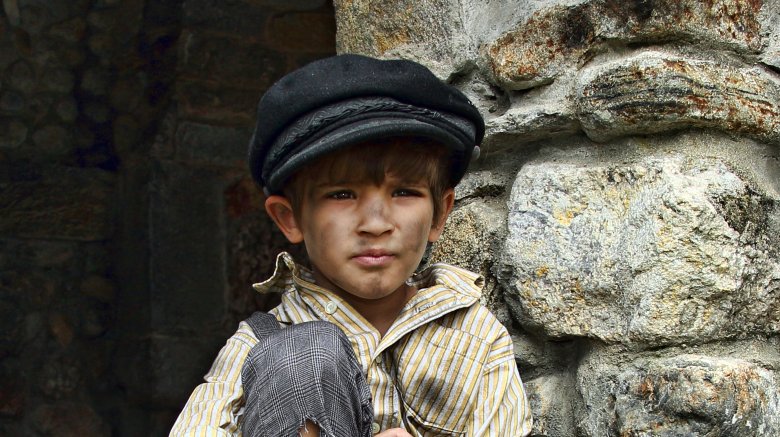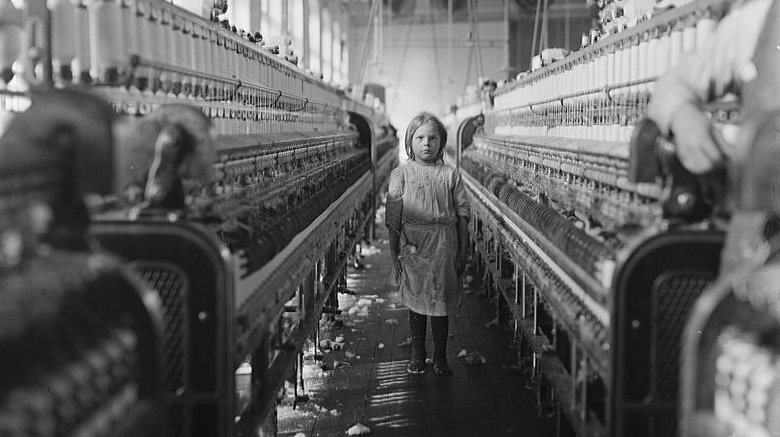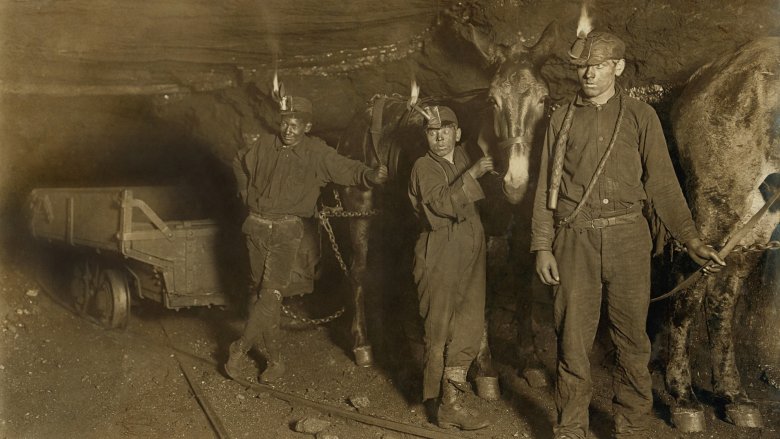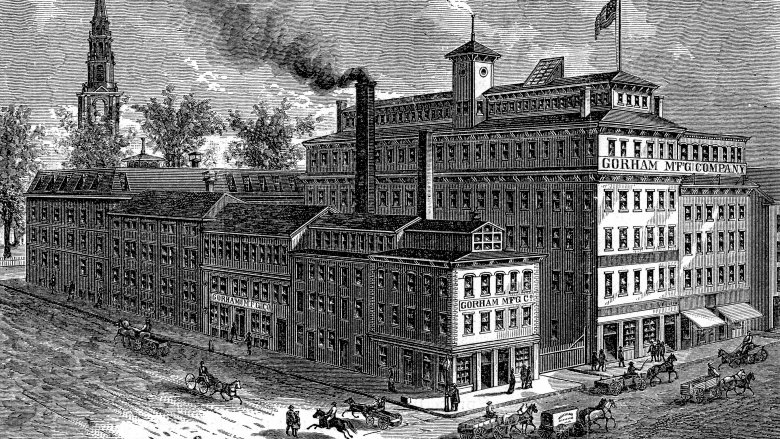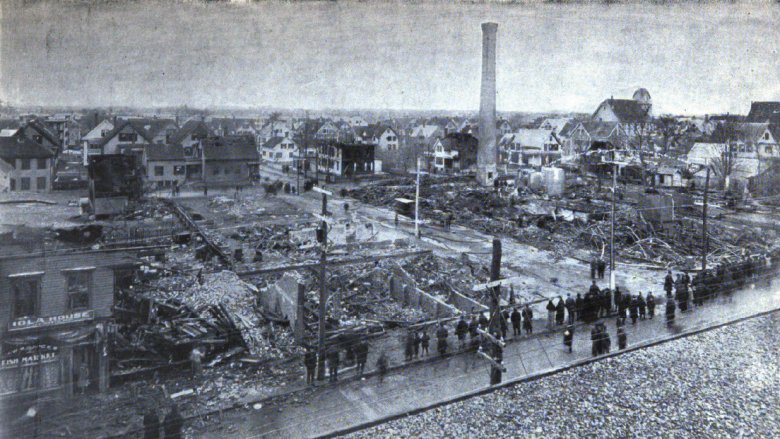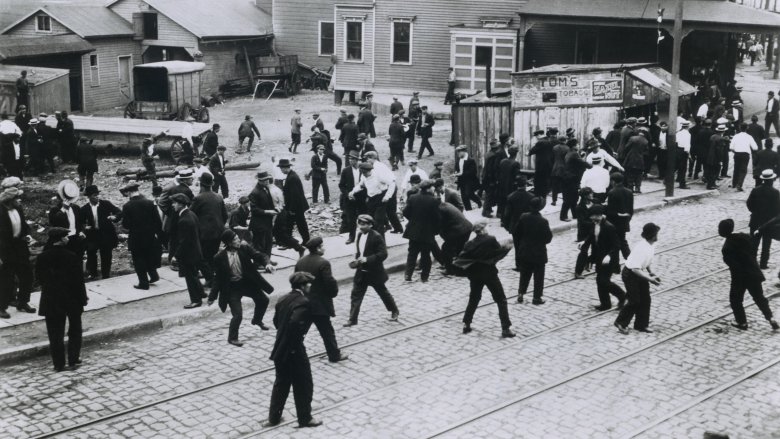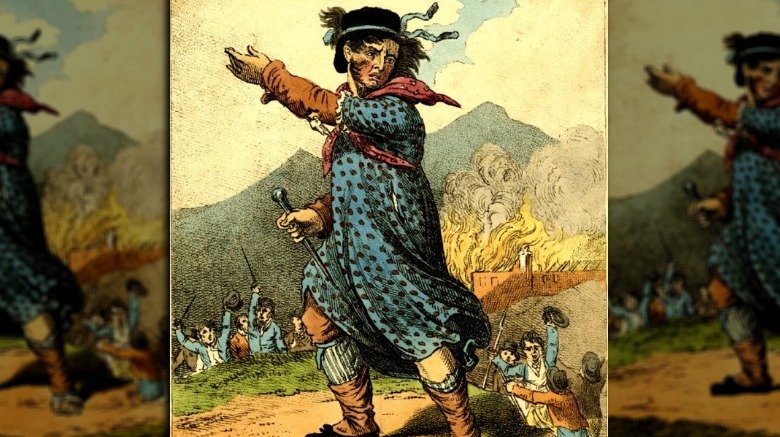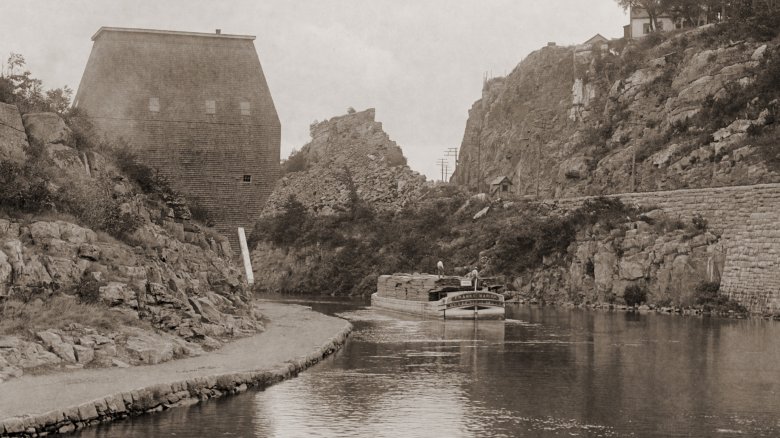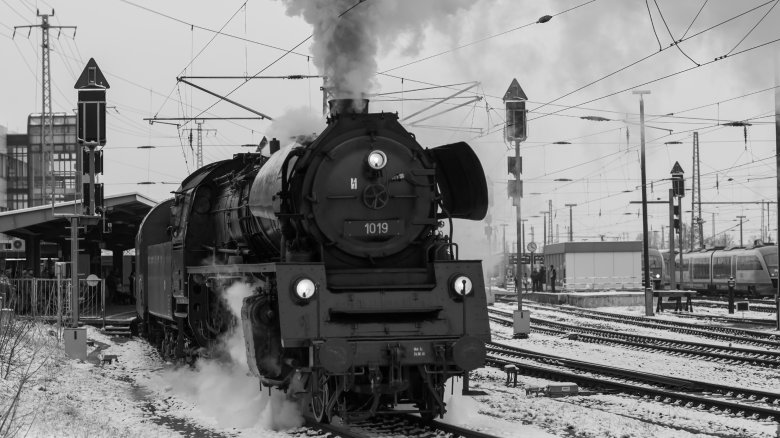Messed Up Things In The Industrial Revolution
The Industrial Revolution is widely remembered as a time of great innovation. Inventions like "the spinning jenny" and the power loom revolutionized the textile industry, and those innovations spread to other industries until factories were creating all kinds of goods that used to be produced by hand.
Essentially, the Industrial Revolution made it possible for us to enjoy mass-produced goods at super-low prices, so now we can overbuy everything, fill our homes with junk we don't need, and then get sick of it all and dump it in the trash — and we don't have to spend a ton of money getting there. Hooray!
But all that innovation came at a high price — people died during the Industrial Revolution. Lots of them. And those who didn't die suffered the loss of a better life, when cottage industry employed just about everyone and no one had to live in a big city with a couple hundred thousand people and their cholera-infested chamber pots (unless they wanted to). So are we really better off today than we were pre-Industrial Revolution? We have some iPhone Xs that say "yes." And also all those other earlier iPhones, too, which we will eventually get around to selling on eBay. Eventually.
Sorry for your loss but it was his own stupid fault
Factory workers during the Industrial Revolution risked their lives every day, and when they were injured or killed on the job, employers mostly just shrugged and hired someone to replace them. There was very little accountability and rarely did anyone publicly question whether the working conditions and lack of safety standards had anything to do with the high number of on-the-job accidents. Even the newspapers usually found some way to blame the victim. According to historian Allen Cornwell, such condemnations were common — when a screw factory worker named Michael Markham was killed by a piece of machinery, the Boston Herald said the cause was Markham's "over assurance of his ability." Other papers accused him of carelessness and essentially blamed him for his own death.
Factories depended on a lack of accountability to keep profits high — safety was too expensive, so they liked to think of their employees the same way they did their equipment. A damaged employee could be replaced. As long as the public didn't start asking questions they could just keep cycling out the dead employees and replacing them with live ones.
Today a single factory explosion makes headlines and results in calls for an investigation and new safety regulations. During 40 years of the Industrial Revolution there were more than 10,000 serious explosions in American factories and it was just sort of seen as an occupational hazard.
Don't whine about being poor when you have a perfectly employable 5-year-old
Modern kids spend a lot of time complaining about how unfair everything is, but at least they get to be kids. During the Industrial Revolution, kids had jobs, and the youngest usually got the most awful, dangerous jobs because they were small and because their parents were desperate and probably wouldn't complain too much if they came home with one missing hand as long as there was a paycheck in the other one.
Kids weren't cut any slack on the job either — according to Eastern Illinois University they were often made to work 10 to 14 hours a day with dangerous machinery in factories that were poorly ventilated and full of toxic fumes. In coal mines, children had to crawl under machines to clean up debris and were made to squeeze through crevices and tunnels that were too small for adult workers. And because they spent their days at work, there was no time for school, so they grew up to be adults who were only really qualified to keep doing the same, dangerous jobs they'd done as children.
Fortunately not everyone saw little kids as cheap labor. Advocates fought for child labor restrictions and reform, and today's kids have those heroes of the past to thank for the hours and hours and hours they get to spend playing video games instead of working in a sweatshop.
Here, take this candle into that gas-filled tunnel
Machines drove the Industrial Revolution, and coal drove the machines that drove the Industrial Revolution. By 1850, Britain's coal mines were producing more than 10 times the amount of coal they'd produced in the previous century, which naturally meant greater demand for workers and greater demand for safety. (Not really about safety, but we can still pretend.)
Coal is a finite resource, so after it was removed from all the easy-to-reach places, it became necessary to dig for it other places, which meant coal mining got exponentially more dangerous. According to Letters and the Lamp, mining tunnels were cramped, prone to collapse, hot, and dark. Miners had to work by candlelight, but there was the small problem of trapped gas that was sometimes encountered in the tunnels, which was highly flammable and thus not really compatible with candles. Underground explosions were common and killed a lot of miners.
On May 25, 1812, 121 miners were inside the Felling Colliery mine on the northeast coast of England when there was an explosion. Ninety-two people died, including several boys as young as 8 and 9. Many of the bodies weren't recovered for more than a month because it was still too dangerous to go into the mine to look for them. That was the disaster that finally made someone think about inventing a non-flammable miner's lamp.
Let's all move to the land of craportunity
Imagine moving to a new land in search of a better way of life and then having it turn out to be worse than the place you came from. Today, we call that "moving to Hollywood as an aspiring actor," or possibly just "immigrating to America." But during the Industrial Revolution millions of rural people left farms and cottage industries, partly because they were seeking better jobs and higher pay, and partly because machines were displacing them. Because information traveled at the speed of plodding, skinny carthorses, there was no way to know if that guy down at the pub really knew what he was talking about when he said there was a pot of gold at the end of the industrial rainbow, so a lot of them just took it on faith, uprooted their families, and learned how much life sucked.
According to History, Future, Now, the factories that employed migrants paid very little and treated workers like commodities, and it didn't matter because those workers could never go back to the dead and dying cottage industries they came from. Americans love cheap stuff, so all those once-skilled craftsmen found themselves working long hours in terrible factory conditions to make products that were vastly inferior to the stuff they'd once made by hand. It sounds awful, but things haven't really changed that much — today, U.S. factory workers have rights, so now all the cheap stuff just comes from China.
Things blow apart
Factories during the Industrial Revolution often had boilers, which were basically lethal bombs that had the side effect of generating the steam that powered industrial machinery. Mostly, though, they were just bombs. They had no basic safety features, such as a way to actually shut them off in case of a malfunction, so they would explode all the time. By one estimate, during the late 19th century there was an average of one boiler explosion every four days, and about 50,000 people a year died as a result.
In March 1905, the boiler inside the Grover Shoe Factory exploded with so much force that it became airborne, crashing through the three stories and causing much of the building to collapse. That was terrible, but then the hot coals in the boiler's fire pit flew everywhere and started fires that were fed by broken gas lines. Many workers were trapped under debris and unable to escape the flames. Local newspapers reported as many as 60 deaths, and several nearby structures were also destroyed.
What remains astonishing about this and all the other boiler explosions that happened during the Industrial Revolution is not the callousness of factory owners toward their workers (because that's a given) but the callousness of factory owners toward their own stuff. Losing an entire building in a boiler explosion had to be pretty bad for the bottom line, so it's bizarre that better boiler safety didn't become a priority a lot sooner.
Let's all move to the land of craportunity, Part II
It doesn't take a historian to figure out that large numbers of people moving into relatively cramped urban areas wasn't just a resources problem, it was also a sanitation problem. As people moved into overcrowded cities, they had to learn how to share things like meager rations, limited space, and poop-contaminated water.
By the summer of 1832 cholera had spread from Europe to New York and everyone knew what that meant. When you got cholera, you might be perfectly fine in the morning and dead by late afternoon. And no one knew how cholera spread, so living in the big city during an epidemic was sort of like being tied up in a field under a hail of arrows — maybe one will hit you, maybe one won't, but there's no way to improve your odds.
A lot of families didn't want to take chances, so they just left, traveling down the Hudson to find a quiet village to live in, which made steamboat owners really happy but seriously pissed off everyone who owned a factory. By the end of the summer nearly half the population of New York — roughly 100,000 people out of 250,000 — had abandoned the city.
A total of 3,000 New Yorkers died in the epidemic, and most of its victims were poor because if you were a rich New Yorker you weren't typically drinking the poop water. Which is also sort of true today, but more in a metaphorical sense.
You have no rights, and it's illegal to complain about it
During Britain's Industrial Revolution, it wasn't illegal to treat your workers like crap, but it was illegal to form a union to ask your employer to stop treating you like crap.
According to A Web of English History, the Combination Acts of 1799 and 1800 were meant to stop what the British government saw as a dangerous trend toward workers wanting to be treated like human beings. The Acts made it illegal to form societies or clubs for the purpose of "political reform" or, more specifically, trade unions, which dared to request a rise in wages that was at least equal to the rise in the cost of living.
The Combination Acts were an expression of the British aristocracy's fear of giving too much power to the lower classes, who might rise up and take all their tea and crumpets away from them. There was also a fear that unionized workers might prevent industry from becoming an efficient war machine — Britain had recently been butt-kicked by the American colonies and was currently at war with France, so it wasn't going to let a little thing like human rights get in the way of victory. Fortunately, the Combination Acts only stood until 1824, when the government acknowledged that they were causing "mutual irritation and distrust" between employers and employees.
A Luddite is not an old guy with a Jitterbug
We still use the word "Luddite" today, mostly as an insult directed at old people who still think cellphones are "newfangled." But "Luddite" actually has its roots in the Industrial Revolution, when it was used to describe a group of British weavers who were understandably annoyed about being made redundant by the invention of machines that were faster and cheaper weavers than they were.
The Luddites responded by organizing — and they weren't about to waste their time faffing around with picketing and appealing to the humanity of factory owners, who probably weren't actually human anyway. Instead, they decided to just destroy the equipment that was putting them out of work.
The British government couldn't have that, so they passed laws in 1812 that didn't just prohibit the destruction of industrial machinery, it made it a capital offense, as in, you will be executed if you destroy industrial machinery. And it wasn't just an idle threat — in the latter part of that same year 14 Luddites were hanged for "frame breaking," and after that the Luddite movement kind of petered out and died with them, along with weaving as a professional trade.
You might die, but it's a living
When you're producing more stuff than your local area knows what to do with, and no one in your local area can afford to buy that stuff anyway because you're paying them all crap wages, you need an easy way to transport goods from Point A to Point B.
In 1817, New York decided to undertake one of the most impressive earthmoving projects to that date — a canal that would travel 363 miles from the Hudson River to Lake Erie. According to Oswego County News Now, it took eight years for 50,000 workers to move the 11 million cubic yards of rock necessary to build the Erie Canal. Around 1,000 of those workers died, or about 1 in 50. Just to put that into perspective, that's about half the odds of dying on Mount Everest while working as a sherpa. Also, sherpas get paid more and their job is kind of cool.
Incidentally, the Erie Canal was a pretty dangerous job site, but it wasn't the most dangerous construction project of all time — that honor goes to the Panama Canal, which had a death rate of 1 worker out of every 2.5. The transcontinental railroad was a minor improvement, with a death rate of 1 in 12.5. So the next time you feel like complaining that the air conditioner at work is too high, remember that it could be a lot worse.
100 people died and nobody got a raise
In 1877 a bunch of railroad workers in West Virginia got annoyed because their wages had been cut, and then they walked off the job. Railroads were pretty important in 1877, and without railroad workers there was no railroad. That was a pretty serious disruption in daily life and in the distribution of goods from the eastern part of the United States to the midwest.
According to ThoughtCo, the strike quickly spread from West Virginia to other states, and pretty soon local officials were appealing to the federal government for help with the "insurrection." In Pittsburgh, troops were dispatched, someone got trigger happy, and 26 people died. The incident turned into a riot, and crowds of people set fire to trains and buildings in retaliation. By the end of the strike two weeks later, 100 workers were dead and the railroad industry was making everyone sign "yellow dog" contracts that banned unionization. It wasn't a great moment for labor rights in America, but it at least helped the public understand some of the major challenges that American workers faced. Evidently all those boiler explosions weren't enough.
